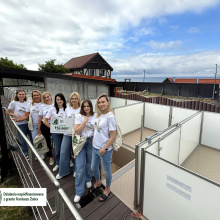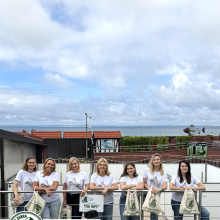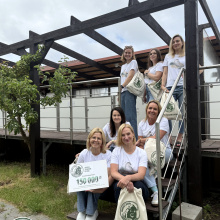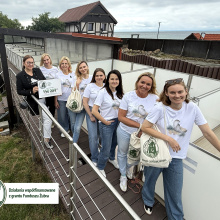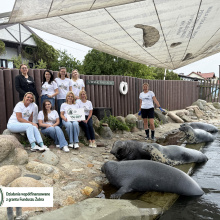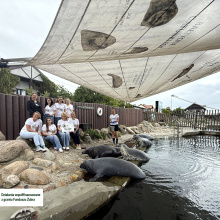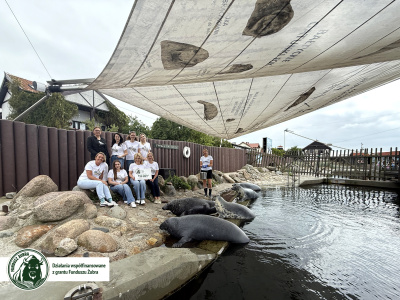
Fot. Agnieszka Beck/FRUG
The Foundation for the Development of the University of Gdańsk and the Prof. Krzysztof Skóra Marine Station of the University of Gdańsk in Hel have received 150,000 zł in funding from the Żubr Fund grant programme for the development of a seal rehabilitation centre. The grant will enable, among other things, the purchase and installation of two specialised isolation rooms for the rehabilitation and treatment of seal pups, the purchase of reagents for morphological and biochemical blood analyses, and the provision of protective clothing for those directly involved in the care of the seals.
The Prof. Krzysztof Skóra Marine Station in Hel, with the support of the Foundation for the Development of the University of Gdańsk, has been conducting activities aimed at protecting endangered Baltic mammals for many years. One such activity is the running of a seal rehabilitation centre. The centre's main patients are grey seal pups (much less frequently ringed and common seals) that have lost contact with their mothers prematurely and require specialist care, including veterinary care, to regain their strength and prepare for independent life in the wild. Grey seals do not breed in Poland – pups found on the Polish coast are mainly born in the northern part of the Baltic Sea, off the coast of Estonia, Finland and Sweden, in late February and early March. Due to the timing of births, the intensive rehabilitation season for pups at the Marine Station lasts from March to June each year – during this period, several dozen young seals receive help and are then released and returned to their natural habitat. Occasionally, adult animals that have been injured or are struggling with infections also arrive at the centre – this year, for example, there was Orlica, about whom we wrote here: First this year's patient at the UG Marine Station in Hel | NEWS - Uniwersytet Gdański.
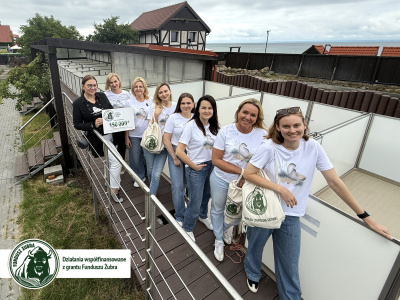
Fot. Agnieszka Beck/FRUG
Due to the increasing number of patients in recent years, it is necessary to expand the ‘seal hospital’ and provide additional isolation rooms. The grant from the Żubr Fund will allow for the purchase and installation of two more isolation rooms, consisting of a beach area (dry) where the seals rest, and a pool where they take so-called physiological baths after each meal to ensure proper digestion. In the later stages of rehabilitation, they learn to eat fish on their own. Each annex, consisting of a dry and wet part, is separated from the others, which allows for the separation of individuals undergoing rehabilitation for quarantine and ensures peace and quiet for patients during their convalescence. Providing more space for rehabilitated seals will also minimise stress in the animals undergoing treatment and facilitate nursing and medical care.
The possibility of immediate diagnosis of health status, ensured by equipping the centre with blood morphology and biochemistry analysers, allows for faster and more effective assistance to patients, but involves the annual purchase of reagents for the above analyses. The purchase of reagents for biochemical blood tests, planned as part of the grant, will enable tests to be carried out in a single rehabilitation cycle.
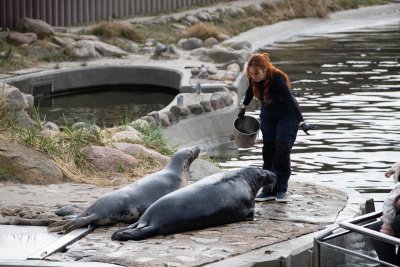
Fot. Bartłomiej Jętczak
Helping the animals would not be possible without the dedication of the seal carers and the veterinarian. Efficient veterinary and nursing care guarantees a faster return of the animals to their environment. In order to provide both the seals and their carers with safe and comfortable conditions for treatment, convalescence and hygiene, as well as professional veterinary and nursing care, it is necessary to provide appropriate protective clothing for those responsible for the daily care of the animals. The funding obtained will allow carers to be equipped with clothing necessary for field work, e.g. when picking up seals from the beach, as well as for performing direct rehabilitation activities at the centre.
An important element of the protection of Baltic mammals is also shaping attitudes and building environmental awareness among the public regarding the support of endangered animal species in Poland. The Marine Station of the University of Gdańsk and the Foundation for the Development of the University of Gdańsk conduct educational campaigns, including through direct contact and education of seal observers on the beach and posting current reports on the rescue of young seals on social media. For the welfare of the animals, it is very important that observers know how to behave when encountering animals on the beach.
Follow the Station's Facebook profile for the latest information.
We also encourage you to follow the FRUG profile.
About the Żubr Fund:
‘In 2024, the Żubr Fund launched a grant programme for institutions and organisations with the aim of financing projects that contribute to the protection of endangered animal species in Poland. The grant programme is another initiative aimed at preserving biodiversity in our country. The primary goal of the Żubra Fund remains the protection of the natural environment in Poland's most valuable natural areas.'
Source: https://funduszzubra.pl/program-grantowy

